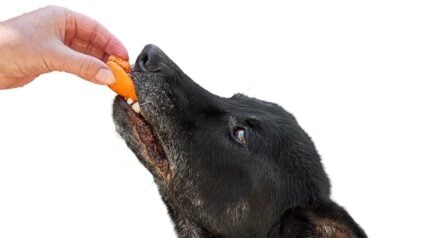Eggplant is a food that people enjoy in a wide range of recipes, but is it safe for dogs? This uniquely shaped plant is popular due to its versatility and nutritional value. For people, eggplants are a healthy pick and find their way into veggie lasagna, casseroles, salads, stir fry, Italian dishes, and more. But can dogs eat eggplant?
The good news is eggplant is safe for dogs but only in moderation. Though a small amount isn’t harmful, there’s more to know about feeding your pup eggplant.
As with any human food, you must take precautions. Let’s get into the details about this egg-shaped food and what you need to know about feeding purple eggplants to Fido.
- Can Dogs Eat Eggplant?
- Can A Dog Be Allergic To Eggplants?
- Is Eggplant Good For Dogs?
- Can Dogs Eat Eggplant With Skin?
- Can Dogs Eat Raw Eggplant?
- Can Dogs Eat Cooked Eggplant?
- How Much Eggplant To Feed Your Dog
- What Other Fruits & Vegetables Are Safe For Dogs?
- Frequently Asked Questions
- Wondering What Else To Put In Your Pup's Bowl?
Can Dogs Eat Eggplant?

Healthy dogs can have eggplant, which is not toxic or dangerous. However, it shouldn’t be an everyday food or replace your pup’s regular food or nutrition.
Dogs can eat eggplant in small amounts, though some canines can be allergic to it. For canines who suffer from health issues like allergies, kidney issues, and arthritis, eggplant is not a good choice as it may affect or worsen symptoms. It contains oxalates, which block the absorption of calcium into the blood. When eaten in more significant amounts, oxalates can lead to the development of bladder and kidney stones.
Kale, spinach, beetroots, and quinoa also contain naturally occurring oxalates. Dogs prone to kidney malfunction and kidney stones should avoid eating these vegetables.
Is Eggplant A Vegetable Or Fruit?
Eggplant is commonly referred to as a vegetable and a popular ingredient in many vegetarian dishes. However, technically, eggplants are fruit. They contain seeds and are related to others in the nightshade family, including tomatoes, blueberries, and peppers. These are often labeled as nightshade vegetables or warm-season vegetables.
They are not poisonous to canines, unlike the nightshade plant. Eggplants are also referred to as egg fruit, aubergine, brinjal, and guinea squash, among several other names. It is sometimes called “mala insana,” meaning “apple of madness,” a name given to it by Europeans due to being a nightshade family member.
Eggplant refers to a variety of different fruits. They can be a range of sizes and colors, but the ones we commonly eat and refer to in the United States are globe eggplants. The fruits are purple, with glossy skin and spongy flesh with a bitter flavor. The texture is similar to squash. The fleshy part absorbs flavor and spices well, taking on the taste of other ingredients cooking with it. It is firm when raw but softens up well when cooked.
Can A Dog Be Allergic To Eggplants?

Some canines may be allergic to eggplants. They may have trouble digesting it and can experience adverse reactions. Allergy symptoms and signs include a rash, itchy skin, stomach upset, vomiting, sore stomach, facial swelling, and diarrhea.
A pup that is allergic to or has trouble tolerating tomatoes will likely have trouble eating eggplants, as both are in the nightshade family. Nightshade vegetables and fruits contain an alkaloid called solanine. Solanine can become toxic if ingested in high amounts, so the produce should only be fed in moderation. The leaves and peels of the plant contain higher concentrations of solanine than the fruit.
Is Eggplant Good For Dogs?
Eggplant contains several beneficial elements and can add some nutritional value to your dog’s diet. For starters, the fruit is very low in calories and sugars. The fruit also contains vitamins and nutrients like folate, niacin, phytochemicals, and antioxidants. It’s also a healthy source of fiber. Calcium promotes healthy bones and teeth, and magnesium boosts neuromuscular function and health.
Eggplants contain several vitamins, including vitamin B, which boosts metabolism, brain function, and energy. Vitamin E supports the metabolism and offers antioxidants. Vitamin K works to promote blood health. While the egg fruit has many nutritional benefits, it’s essential to remember that canines have different dietary health needs than humans. So, while it is an incredibly healthy choice for humans and can be a healthy snack in moderation, it’s not a good idea to substitute it for meals.
Can Dogs Eat Eggplant With Skin?
No, they should not eat the skin. While they can technically consume it, the skin is tougher to chew, has a bitter flavor, and contains trace amounts of solanine, which is toxic to canines and humans when eaten in large amounts.
They should also avoid ingesting the stems, flowers, and leaves. These elements contain higher concentrations of solanine. The leaves contain the highest concentration. Always peel any fruits or veggies you plan to feed your pup first and ensure no small bits and pieces of skin are left.
The seeds are not toxic or hard enough to be a choking hazard. Many people cook and eat them with the fruit, and others scoop them out. Because of the odd texture and flavor, most pets would likely enjoy this fruit with the seeds removed.
Can Dogs Eat Raw Eggplant?
Canines can eat the raw fruit if the skin has been removed and the flesh is cut into bite-size pieces. However, when cooked, the texture becomes much more pleasant and palatable, so many pups may prefer to have it cooked. The raw fruit also has a slightly bitter, somewhat off-putting flavor that some animals may not enjoy. That said, the raw fruit is not toxic or dangerous when appropriately served.
Can Dogs Eat Cooked Eggplant?

A dog can eat eggplant cooked or raw. Roasted, steamed, grilled, or baked, the fruit is safe as long as it has not been prepared with any other ingredients. Though we like our food with lots of flavor, canines should only have this food plain. Never prepare food for your pup with onion or garlic, as these are toxic to them.
Some owners steam or roast the fruit after peeling and then make a mash of it, which they then use as an ingredient in healthy homemade dog treats. The fruit can also be roasted, chopped, and added as a topper or mixed into your pup’s regular food.
How Much Eggplant To Feed Your Dog
It should only be served to pets in small amounts. Adding a few bite-sized pieces to their bowl periodically is safe and can add flavor variety. The amount a dog can safely consume is proportionate to their size. Eating too much plant material can lead to digestive issues and problems like gastrointestinal distress, gas, diarrhea, and constipation.
Any kind of dog treat, even fresh produce like this, should only make up 10% of a canine’s daily calorie intake. Fruits and vegetables should make up at most 10 to 20% of their overall diet.
Start with a few bite-size pieces, and cut them up to match the size of your pup’s mouth. Always start small and observe your dog for several hours, and even the next day or so after trying a new food. If you notice any signs of distress or allergic reaction, be sure to contact your veterinarian right away.
What Other Fruits & Vegetables Are Safe For Dogs?

Fresh produce can bring added flavor and textural variety to our pup’s sometimes boring diets. Many fruits and vegetables are safe for dogs to eat in moderation if they’re prepared properly. These include apples, bananas, beans, blueberries, broccoli, butternut squash, cantaloupe, carrots, pears, pumpkin, spinach, and zucchini.
Learn more about all this in our guide about fruits and vegetables dogs can and can’t eat.
Never feed your dog grapes or raisins, as these are highly toxic to dogs. Stay away from pitted fruits, as the pits are choking hazards and may contain toxic elements. Avocados, for example, are not safe, nor are raw potatoes. Onions, garlic, shallots, chives, unripe tomatoes, and more are not safe.
Even though eggplant is safe in small amounts, our pets will undoubtedly encounter many hazards and dangers daily. Because an emergency can happen to any dog at any time, many owners consider pet insurance. Pet insurance can help cover the cost of care in emergencies, removing part of the stress and burden and allowing owners to ensure they can afford the care their pet needs.
Frequently Asked Questions
I know there are still plenty of questions about dogs eating eggplant. Below, I cover a few of the most often asked. If I missed your question, let me know in the comments.
Can a dog eat eggplant parmesan?
Generally speaking, canines should not eat eggplant parmesan. This heavily breaded, spicy dish has many other ingredients, including cheese and tomato sauce, that are hard for canines to digest. Along with the high acidic content, this dish uses plenty of seasonings, oils, and fats intended for human consumption.
My dog ate a piece of breaded eggplant. Will he be okay?
Dogs who have just a piece or two of breaded, fried foods will usually be fine as long as this is a one-time occurrence and not something that is part of their everyday diet. While these taste delicious, they are generally prepared in high-fat, unhealthy oils with heavy seasonings like onion and garlic. Even making this dish for your dog yourself requires the addition of other ingredients as well as frying the fruit in oil.
Is eggplant with eggs good for dogs?
Though an uncommon and somewhat unappetizing combination, dogs can eat plain eggplant with eggs, provided the eggs are cooked thoroughly. Undercooked eggs and raw foods carry a risk of salmonella contamination. Salmonella infection in a dog is quite serious and unpleasant for the pet and the owner.
Wondering What Else To Put In Your Pup’s Bowl?
No fruit, vegetable, or additive to your pup’s diet should replace healthy, well-balanced dog food. Fortunately, there are a growing number of high-quality options to choose from. As we become more conscious of our own health and diet connection, we also want to give our pups the healthiest dog food possible.
There are several fresh dog food delivery options if you’re interested in feeding your pup freshly made, human-grade meals. Along with that, many companies are now making freeze-dried and air-dried foods. This is wonderful news if you want to add fresh nutrition and flavor to your pup’s diet but may not be ready to take on that task at home. Always speak with your veterinarian about specific dietary and health concerns.





